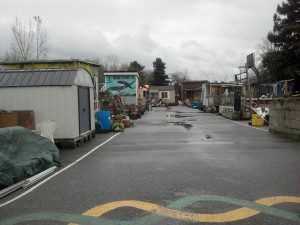This is the oldest/longest running of the villages.
They too, have a fence. A security station at the entrance that is staffed by people who live there – they have to do 2 hours a week. They have 5 rules that people have to follow:
1. No violence toward yourself or others.
2. No illegal substances or alcohol or paraphernalia on the premises or within a one-block radius.
3. No stealing.
4. Everyone contributes to the upkeep and welfare of the village and works to become a productive member of the community.
5. No disruptive behavior of any kind that disturbs the general peace and welfare of the village.
They try to deal with their issues internally when possible. You have to check in, you have to be with a member at all times you are there if you are a visitor. They have a donation center,
a house where they sell things on ebay, a greenhouse.
They are on cement, so everything has to be grown in raised beds.
Portapotties. Electricity and water only has one source,
so the common area has electricity and if you want to use electricity, you have to pay for extra time. The common house is the only place that has heat – that is the only place wood can be burned.
Garbage is picked up by the city but they have to pay for it. They currently have 57 people, they have a maximum of 60. They can have an additional 10 people stay there in the winter in their common house. The city restricts the number of people who can be there.
They were redoing a couple buildings while we were there.
Each of the houses is painted differently and seemed to have a story behind it.
The houses were all made out of donated materials – or donated in its entirety.
The residents pay $25 a month to stay there – to pay for insurance and other expenses. They have weekly council meetings everyone must attend.
I thought the place was pretty isolated,
and it was next to a correctional institution. On land no one wanted, but it was on a bus line.
They were concerned because recently the city had told them that people could only stay up to 2 years. Some of the residents we had talked to had been there for 5 years or more. I’m not sure where they expect some of the folks to go to if they have been there too long or why the rules was put in place – again, more research needed. We got their contact info and they offered to let us skype in to cone of their community meetings.
My favorite part of the tour was the explanation that each of the cats on the house once lived at Dignity Village – each had a name and our tour guide was sure to tell us about each of them.

Thank you for an excellent article. I have volunteered for affordable housing/homelessness issue orgs for 30 years in Seattle, WA, most recently with Real Change Homeless Newspaper and Ballard Community Taskforce on Homelessness and Hunger (BCTHH).
The latter org is exploring the opportunity to tour Dignity Village in order to help address issues raised in Seattle now that the Mayor and City Council have approved the first City gov sponsored tent cities (3). SHARE/WHEEL has managed church sponsored Tent City camp sites for several years, but the need is growing and now Seattle is trying to expand access to shelter with more self managed sites.
Your article and photos help us understand the history of Dignity Village.